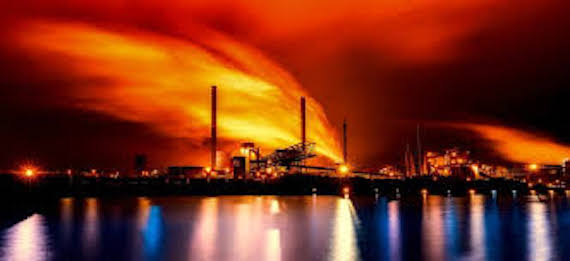

About the Author
Wisconsin Examiner The Wisconsin Examiner is a nonpartisan, nonprofit news site offering a fresh perspective on politics and policy in our state. As the largest news bureau covering state government in Madison, the Examiner offers investigative reporting and daily coverage dedicated to the public interest. We take our inspiration from the motto emblazoned on a ceiling in our state Capitol: “The Will of the People Is the Law of the Land.”


 © 2025 All Rights Reserved
© 2025 All Rights Reserved
Dr. Joel Charles
( Wisconsin Examiner ) – Every day last week I woke up dismayed to see the haze from the Canadian wildfire smoke.
I am dismayed because as a rural family doctor I know how damaging this smoke is to my community. I am dismayed not just at the harm this summer’s smoke is doing to my community. I am dismayed because I know how much worse climate change will make this problem if we don’t act. But I am also hopeful, because our society has the tools to address climate change, and because you, dear reader, have a role in making sure those tools get used.
You should protect yourself and your family from this summer’s climate smoke by taking informed precautions. You can protect yourself and your family from longer term climate threats by raising your voice and making sure the EPA sets the strongest possible safeguards against vehicle and power plant pollution.
My colleagues and I have watched our vulnerable patients get sick from this smoke. Super-fine particles in air pollution cross the lungs into the blood, causing inflammatory damage in nearly every part of the body, and can even cross the placenta to harm developing fetuses.
For healthy people, in the short term, smoke like this mostly causes irritation. But for people with lung or heart disease, even short exposure can be dangerous. Over the long term, particulates harm everyone.
Whether particulate air pollution comes from burning forests or burning fossil fuels, there is no safe level of exposure. Particulate air pollution contributes to preterm birth, stillbirths, delayed cognitive development in children, asthma, COPD, heart disease, cancer, and dementia. When you do the work I do, you know those are real impacts, on real people.
It is a tragic irony that while the U.S. has made dramatic progress in improving health over the last 50 years by limiting traditional pollutants from fossil fuels, our failure to adequately limit greenhouse gas pollution is now driving climate change, igniting wildfires, and erasing much of those gains.
Even without climate-driven wildfire smoke, burning fossil fuels damages our health daily. At least 1,900 Wisconsinites die every year from fossil air pollution. It costs us at least $21 billion dollars a year in health-care costs and decreased productivity.
We will save money and improve our health immediately by kicking the fossil fuel habit, it’s a win-win. When you consider the health threat of climate change on top of that, it gives us urgency in kicking that fossil fuel habit.
The good news is that we have better, cleaner, and cheaper ways to get the energy we need. Right now the EPA is considering stronger vehicle and power plant pollution limits, giving us a chance to both clean our air now and limit future worsening of climate change, including wildfires.
Via Pixabay
But just as Big Tobacco blocked progress on addressing the harms of smoking, fossil fuel executives and the politicians they own are standing in the way of this opportunity, keeping us stuck using dirty, expensive fossil fuels that make us sick and destabilize the world.
It’s worth looking at past lessons. Students of the Clean Air Act know that when better energy technology is available the benefits from implementing it typically far outweigh the costs. Fossil fuel executives who want weak environmental standards routinely overestimate the logistical challenges, negative impact, and cost of transitioning to cleaner technologies. Transitioning is almost always easier, quicker, cheaper and more beneficial than expected. Given that well-established precedent, the EPA should discount what is said by those who argue for weaker air pollution safeguards.
From where I sit, as a former kid with asthma in a poor neighborhood, as a doctor who takes care of vulnerable people and as a father concerned about the world I leave my children, I find the arguments for weak vehicle and power plant pollution limits not only lacking in evidence but, frankly, morally insufficient.
By coming together and demanding better, our society weakened Big Tobacco’s grip on us. Now we face a new challenge: kicking the fossil fuel habit and protecting ourselves from the climate threats we’re seeing outside our windows every day this summer.
It’s time to stand up to the fossil fuel industry the same way. If you want to quit fossil fuels and breathe easy, visit wiclimatehealth.org/EPA where citizens are weighing in, telling the EPA to finalize the strongest possible safeguards against vehicle and power plant pollution.
Dr. Joel Charles
Dr. Joel Charles is a family physician practicing in rural southwest Wisconsin where he serves as medical director for the Kickapoo Valley Medical Clinic. From the University of Wisconsin School of Medicine and Public Health he received his MD and Master of Public Health degrees, the latter focusing on climate and health. He attended both those programs as a recipient of the Jack Kent Cooke Graduate Scholarship. He completed residency at Sutter Santa Rosa Family Medicine. Upon returning to Wisconsin he helped found Healthy Climate Wisconsin, a fast growing group of health professionals committed to advocating for equitable solutions to the climate crisis in order to protect Wisconsinites. His young children Finn and Juniper help him remember why he does this work.
Published under Creative Commons license CC BY-NC-ND 4.0.
Wisconsin Examiner